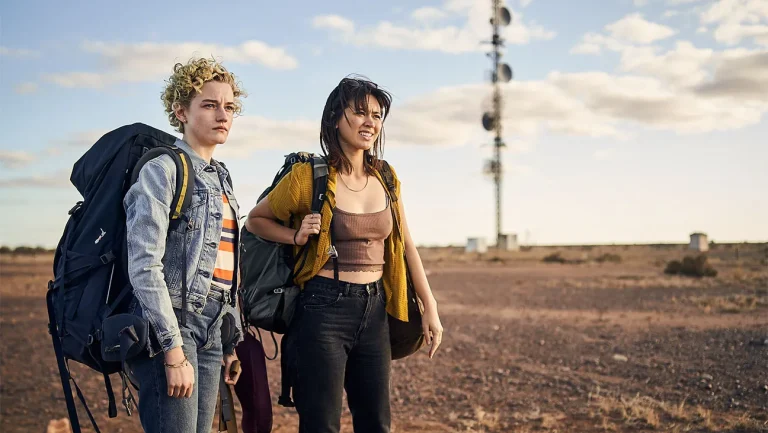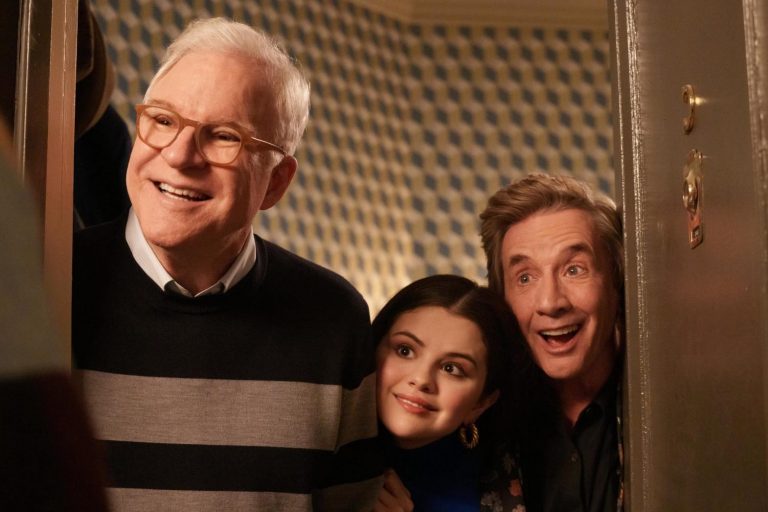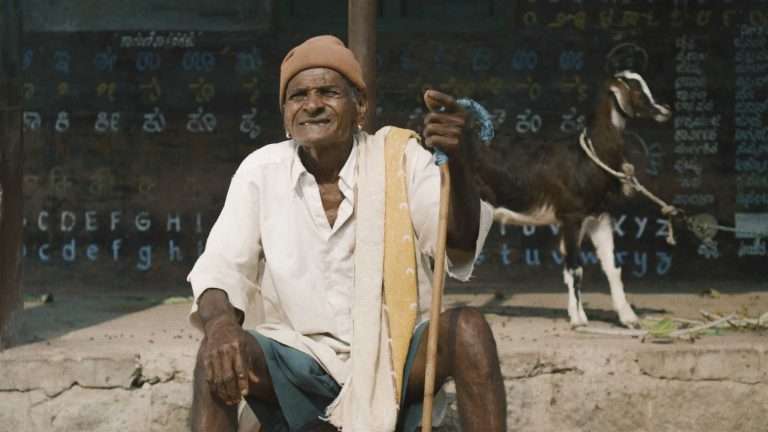Giving Birth To A Butterfly (2021) Movie Review: Apart from its fantastical title, the most arresting thing about Giving Birth To A Butterfly is its casting. In the film, real-life wife and husband Annie Parisse and Paul Sparks play a couple in a tumultuous marriage. Similarly, actress Gus Birney and her mother Constance Shulman take the role of a pregnant woman and her tragically delusional mother. This offbeat casting (not an anomaly in the indie circuit) is not the only surreal aspect of the film. Director Theodore Schaefer’s debut film starts off as a typical working-class drama but, by the end, chooses to break free of realist constraints to allow its protagonists to imagine an alternative to their stifling lives.
When the film opens, we follow Diana (Annie Parisse) as she prepares to sell her wedding dress. If this wasn’t symbolic enough of her broken marriage or economic hardship, we soon see her husband, Daryl (Paul Sparks), returning home with a frustrated temperament. Daryl works for a food joint, not as a chef (which he wants to be), but as a mere waiter. While Daryl can vent out his frustrations by banging doors and fantasizing about the name of his prospective food joint, Diana’s anguish is more restrained. Just when their economic hardships couldn’t go worse, their son Andrew (Owen Campbell) brings home a pregnant girlfriend, Marlene (Gus Birney). Even though the baby isn’t his, Andrew has agreed to be the father to the child—a choice that doesn’t fit well with Diana.
However, the very next day, Diana is met with another problem when she realizes her credit card is not working and that her account has been seemingly drained of all the money. Realizing that a company might have scammed her, Diana decides to travel to their given address. Since she cannot take their only car to the place, Diana has to travel with Marlene, who owns a vehicle. A meek and restrained Marlene is only eager to help. As the two women embark on this journey, they share their fears and aspirations and realize that life can be lived anew, even with a broken fate. And when they both finally land at their destination, their dreams and reality overlap, leading to a conclusion that would enable self-discovery for both.
Schaefer’s choice to shoot the film in 16mm with an aspect ratio of 1.33:1 gives the film a feeling of a memory and dream that ultimately compliments the surreal aspect of the narrative. Even though the film is rooted in American society’s contemporary economic and gendered malaise, cinematographer Matt Clegg lends the film a nostalgic poetic quality.
Considering the film’s central theme is being trapped in your past and present circumstances, this formal choice complements the narrative core. Henrik Ibsen’s mention recurs throughout the film, especially as the production of Ghosts is being staged in the town. But as Schaefer and co-writer Patrick Lawler have acknowledged that the film holds much in common with Doll’s House and its feminist concerns about being stifled in a domestic household.
As Diana and Marlene hit the road, the narrative becomes dialogue-heavy as we get to learn more about our two central protagonists. The approach is quite mumblecore-ish, infused with a fantastical spirit, as Marlene’s words exude poetry in contrast to Diana’s more materially grounded world. Gus Birney, as Marlene, brings an innocent fragility to her role.
While initially seeming too subservient and feminine, Birney’s character (in a riveting monologue) reveals her introverted side and the circumstances that ultimately led her to make a decision for her baby. Annie Parisse’s Diana seems rational and composed but slowly unwraps the tumultuous side of her life. Her husband, Daryl, appears like a caricature of a controlling and angry white man. Still, Paul Sparks imbues a humanistic side to the character that enables an understanding of him as another victim of the current capitalist system.
The film’s most interesting character is Monica (Constance Shulman), a faded actress and Marlene’s mother who spends her days like Norma Desmond, waiting for the media and press to interview her. Initially resembling a shallow star unaware of the reality around her, she becomes the film’s most tragic character as we know that, unlike Diana, she will never be able to get over her circumstances.
While the film’s surreal end does lend it some optimism, this genre-blending does not always flesh out its most pressing concerns. The solution seems too fantastical for a film that initially seemed rooted in realism, although it is not without its radical polemic. Those wishing for something more than just a slice of life will find much to appreciate in this debut.

![Goddess of the Fireflies [2020] Review – A story of freedom](https://79468c92.delivery.rocketcdn.me/wp-content/uploads/2020/04/Goddess-of-the-Fireflies-highonfilms-768x398.jpg)

![About Love [2019] Review: A Nuanced Exploration of Love in a Regular, Indian Family](https://79468c92.delivery.rocketcdn.me/wp-content/uploads/2021/08/About-Love-2019-MUBI-2-768x432.jpg)
![The Platform (El hoyo) [2020] Netflix Review – A Fiendishly Entertaining Allegory on Social Inequality](https://79468c92.delivery.rocketcdn.me/wp-content/uploads/2020/03/The-Platform-2020-768x512.jpg)

